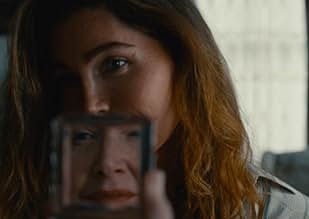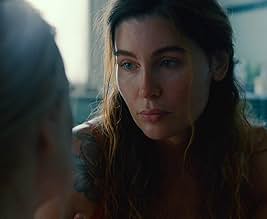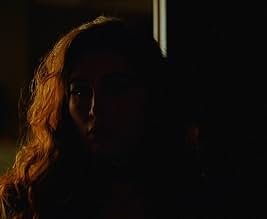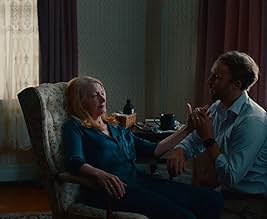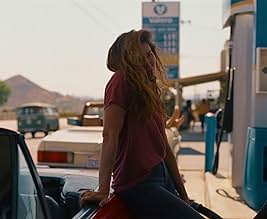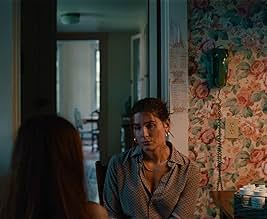VALUTAZIONE IMDb
6,3/10
1670
LA TUA VALUTAZIONE
Il ritratto intimo di una donna che torna a casa per prendersi cura della madre morente. Una storia piena di sfumature di una famiglia fratturata, che esplora temi universali di abbandono, i... Leggi tuttoIl ritratto intimo di una donna che torna a casa per prendersi cura della madre morente. Una storia piena di sfumature di una famiglia fratturata, che esplora temi universali di abbandono, invecchiamento, accettazione e redenzione.Il ritratto intimo di una donna che torna a casa per prendersi cura della madre morente. Una storia piena di sfumature di una famiglia fratturata, che esplora temi universali di abbandono, invecchiamento, accettazione e redenzione.
- Regia
- Sceneggiatura
- Star
- Premi
- 5 vittorie e 17 candidature totali
Vladimir John Perez
- Car Repairman
- (as Vladimir Perez)
Bobby Easley
- Trucker
- (as Bobby Easly)
Bryant Bentley
- Mechanic
- (as Bryant Lewis Bentley)
Chelo
- Hairdresser
- (as Chelo Acosta-Conley)
Mark Angel
- Mechanic
- (non citato nei titoli originali)
Recensioni in evidenza
"Monica" is a profoundly moving drama directed by Andrea Pallaoro, encapsulating the poignant journey of Monica, sensitively portrayed by Trace Lysette, a transgender woman facing the ghosts of her past while tending to her terminally ill mother, played by Patricia Clarkson. The film delicately unravels the complexities of familial rejection, hurtful memories, and the pursuit of forgiveness. Pallaoro crafts a mesmerizing slow burn, each scene pulsating with intense emotions, yet wrapped in delicate vulnerability. The movie intricately navigates the intricacies of human connections, depicting the nuances of reconciliation and the profoundness of healing. Lysette's performance is remarkable, carrying the weight of Monica's emotional journey with authenticity, while Clarkson delivers a compelling portrayal that adds depth to the narrative. The cinematography beautifully captures the essence of each moment, elevating the film's impact. "Monica" stands tall with its exceptional storytelling, powerful performances, and a heartfelt exploration of acceptance, making it a definitive 10/10 movie experience.
Greetings again from the darkness. The emotional strain associated with being estranged from one's family reaches a level only those involved can comprehend. In this touching film from writer-director Andrea Pallaoro and co-writer Orlando Tirado, we focus on the return and attempted re-connection of one such person.
The first 15 minutes of the film move at an excruciatingly slow pace, as we get a feel for Monica's (Trace Lysette, "Transparent", HUSTLERS 2019) everyday struggles. It appears there is no joy in her life as relationships unravel, and she attempts to find her way. A phone call notifies of her mother's deteriorating health due to a brain tumor. The news draws Monica back home for the first time since she left years ago. Greeted with a hug from her sister-in-law Laura (Emily Browning, SUCKER PUNCH 2011), Monica meets her nieces and nephews for the first time. A reunion with brother Paul (Joshua Close) is initially quite awkward. The siblings do get their moment a bit later, although it's when Monica is by her mother's side that the film excels.
Patricia Clarkson plays Eugenia, a woman whose brain tumor is wreaking havoc not just on her physical presence, but also her emotions. At times, she's merely a child calling for her own mother, while at other times, she's hard-headed and demanding that she can take care of herself ... this despite the constant attention from her caregiver, Letta (Adriana Barraza, BABEL 2006). She doesn't appear to recognize Monica, and a running theme is, "Are you going to tell her?" We feel Monica's pain as she attempts to find solace in merely being close to her mother, but it's in the bathtub scene where Clarkson's incredible talent shines through, and the many webs of deceit and uncertainty reach a conclusion.
Lysette's performance as Monica captures the vulnerability that allows the film to work. Is she isolated or trapped ... or is it both? It's a role that takes 45 minutes of screen time before she's allowed a smile, though her Cocteau Twins t-shirt is appreciated. Pallaoro's approach here is restrained (an understatement), and he gives up backstory hesitantly, and in small doses and hints. No scene is overrun with dialogue. Cinematographer Katelin Arizmendi uses close-ups effectively to convey the emotional strain and unseen barriers to closeness. The result is a strong family drama on relationships, decisions, acceptance/rejection, and health issues.
Opens on May 12, 2023.
The first 15 minutes of the film move at an excruciatingly slow pace, as we get a feel for Monica's (Trace Lysette, "Transparent", HUSTLERS 2019) everyday struggles. It appears there is no joy in her life as relationships unravel, and she attempts to find her way. A phone call notifies of her mother's deteriorating health due to a brain tumor. The news draws Monica back home for the first time since she left years ago. Greeted with a hug from her sister-in-law Laura (Emily Browning, SUCKER PUNCH 2011), Monica meets her nieces and nephews for the first time. A reunion with brother Paul (Joshua Close) is initially quite awkward. The siblings do get their moment a bit later, although it's when Monica is by her mother's side that the film excels.
Patricia Clarkson plays Eugenia, a woman whose brain tumor is wreaking havoc not just on her physical presence, but also her emotions. At times, she's merely a child calling for her own mother, while at other times, she's hard-headed and demanding that she can take care of herself ... this despite the constant attention from her caregiver, Letta (Adriana Barraza, BABEL 2006). She doesn't appear to recognize Monica, and a running theme is, "Are you going to tell her?" We feel Monica's pain as she attempts to find solace in merely being close to her mother, but it's in the bathtub scene where Clarkson's incredible talent shines through, and the many webs of deceit and uncertainty reach a conclusion.
Lysette's performance as Monica captures the vulnerability that allows the film to work. Is she isolated or trapped ... or is it both? It's a role that takes 45 minutes of screen time before she's allowed a smile, though her Cocteau Twins t-shirt is appreciated. Pallaoro's approach here is restrained (an understatement), and he gives up backstory hesitantly, and in small doses and hints. No scene is overrun with dialogue. Cinematographer Katelin Arizmendi uses close-ups effectively to convey the emotional strain and unseen barriers to closeness. The result is a strong family drama on relationships, decisions, acceptance/rejection, and health issues.
Opens on May 12, 2023.
"Monica"
"Monica" is a portrait of a woman who returns home to the Midwest for the first time in 20 years to confront the wounds of her past. Reconnecting with her mother Eugenia (Patricia Clarkson) and the rest of her family for the first time since leaving as a teenager, Monica (Trace Lysette) embarks on a path of healing and acceptance. Monica is reunited with her family for the first time since her youth. Uncertain if her mother will recognize her, Monica moves into her childhood home, hoping to heal the wounds of the past and forge a new path of forgiveness and acceptance. Exploring the universal thematic dichotomies of aging and beauty, rejection and alienation, the film details Monica's world and state of mind, the pain and fear, the needs and desires, of a woman whose journey ultimately illuminates the human condition. The film delves into Monica's internal world and state of mind, her pain and fears, her needs and desires, to explore the universal themes of abandonment and forgiveness.
Monica is a film about family, abandonment, and acceptance. It's also a film that centers a Trans-woman character. Monica has been on her own since her mother dropped her off at the bus station as a teenager with only 5 minutes to spare and the message, 'I can't be your mother anymore'. We don't follow Monica during those early teen years, and that time is only hinted at. We meet her as an adult, but one that still carries that wound of early abandonment that we get the first taste of very early in the film when she calls Jimmy (Joshua Close). Jimmy is a man we never see who we only know through her attempts to contact him, but we see and hear the need to try and keep him in her life, to not be left behind by him. Then Monica receives a call she never thought she'd receive, not from Jimmy, but from the sister-in-law she never met, asking her to come back home to help care for her mother, who's losing her memory along with her health. The film never denies how difficult it's for Monica to return to the scene of her trauma but also doesn't deny her the joy of forging new relationships with her niece and nephews.
It also doesn't give an easy resolution to her relationship with her mother, whom she now has to mother, who denied her mothering when she still needed it. Her mother doesn't recognize her right away like she secretly hoped. Though that may have been the only way for them to find a healing place, because Eugenia is not the same woman anymore that abandoned her, and that might be a way that helps Monica heal a bit from the pain of abandonment and finally call out Jimmy. And in the end, Eugenia does accept Monica as family, whether she finally recognized Monica as her daughter is not fully answered, but we think she did, even if it's not voiced. The film does a good job of balancing the moments of joy with moments of sadness. From the topic, you might not expect there would be laughs, but there are plenty during certain scenes in the film particularly at one move during a solo dance scene. There are also moments that just makes us smile while watching. The film ends with a scene of Monica's nephew signing the US National anthem at school graduation. It's a moment of healing and catharsis.
When your mother becomes sick, this confront you with your past and the psychological effects of abandonment. Treading between the interior and exterior, the emotional and physical, Monica explores the complexities of self-worth, the deep-rooted consequences of rejection and the lengths we go to heal our wounds. Through a cinematic language that stems from the juxtaposition of the aesthetics of intimacy and alienation, the film delves into the emotional and psychological landscape of Monica to reflect the precarious nature of self-identity when challenged by the need to survive and ultimately transform. The dialogues are unintelligent, clumsy, and brainless. The ending feels overly rhetorical.
Written by Gregory Mann.
"Monica" is a portrait of a woman who returns home to the Midwest for the first time in 20 years to confront the wounds of her past. Reconnecting with her mother Eugenia (Patricia Clarkson) and the rest of her family for the first time since leaving as a teenager, Monica (Trace Lysette) embarks on a path of healing and acceptance. Monica is reunited with her family for the first time since her youth. Uncertain if her mother will recognize her, Monica moves into her childhood home, hoping to heal the wounds of the past and forge a new path of forgiveness and acceptance. Exploring the universal thematic dichotomies of aging and beauty, rejection and alienation, the film details Monica's world and state of mind, the pain and fear, the needs and desires, of a woman whose journey ultimately illuminates the human condition. The film delves into Monica's internal world and state of mind, her pain and fears, her needs and desires, to explore the universal themes of abandonment and forgiveness.
Monica is a film about family, abandonment, and acceptance. It's also a film that centers a Trans-woman character. Monica has been on her own since her mother dropped her off at the bus station as a teenager with only 5 minutes to spare and the message, 'I can't be your mother anymore'. We don't follow Monica during those early teen years, and that time is only hinted at. We meet her as an adult, but one that still carries that wound of early abandonment that we get the first taste of very early in the film when she calls Jimmy (Joshua Close). Jimmy is a man we never see who we only know through her attempts to contact him, but we see and hear the need to try and keep him in her life, to not be left behind by him. Then Monica receives a call she never thought she'd receive, not from Jimmy, but from the sister-in-law she never met, asking her to come back home to help care for her mother, who's losing her memory along with her health. The film never denies how difficult it's for Monica to return to the scene of her trauma but also doesn't deny her the joy of forging new relationships with her niece and nephews.
It also doesn't give an easy resolution to her relationship with her mother, whom she now has to mother, who denied her mothering when she still needed it. Her mother doesn't recognize her right away like she secretly hoped. Though that may have been the only way for them to find a healing place, because Eugenia is not the same woman anymore that abandoned her, and that might be a way that helps Monica heal a bit from the pain of abandonment and finally call out Jimmy. And in the end, Eugenia does accept Monica as family, whether she finally recognized Monica as her daughter is not fully answered, but we think she did, even if it's not voiced. The film does a good job of balancing the moments of joy with moments of sadness. From the topic, you might not expect there would be laughs, but there are plenty during certain scenes in the film particularly at one move during a solo dance scene. There are also moments that just makes us smile while watching. The film ends with a scene of Monica's nephew signing the US National anthem at school graduation. It's a moment of healing and catharsis.
When your mother becomes sick, this confront you with your past and the psychological effects of abandonment. Treading between the interior and exterior, the emotional and physical, Monica explores the complexities of self-worth, the deep-rooted consequences of rejection and the lengths we go to heal our wounds. Through a cinematic language that stems from the juxtaposition of the aesthetics of intimacy and alienation, the film delves into the emotional and psychological landscape of Monica to reflect the precarious nature of self-identity when challenged by the need to survive and ultimately transform. The dialogues are unintelligent, clumsy, and brainless. The ending feels overly rhetorical.
Written by Gregory Mann.
10rksharp
This movie was so poignant to me that I'm having a hard time putting my review into words. I feel like I can't possibly write my review well enough to give this movie the credit it deserves.
Having been a family caregiver several times, I was amazed at the accuracy with which the caregiving experience was captured, especially in an estranged family. Trace Lysette played the role of Monica so well that I could feel the sadness, reluctance and discomfort of returning home to an ill mother in a family who hadn't been accepting of her. I've felt those feelings, so I was very aware of how well she was portraying them. I'm also familiar with the forgiveness she brought to the loving care of her mother and how she extended that to the rest of the family, especially her nieces and nephews - familiar because of how well Trace played the role.
I was also amazed by how well Patricia Clarkson played the role of. Eugenia. There were several scenes that brought me to tears, because they were so familiar in my own caregiver experience.
In addition to the excellent acting throughout the movie, I was really impressed with the work of the art department. The way the family home was presented was so reminiscent of an elderly family members home with so many memories displayed, reminisced about, and how the young children interacted in the home. One of the most powerful moments was when the abandoned swimming pool was shown and discussed. Caregivers always have more than they can handle and something/some things always end up getting neglected. That was portrayed so vividly and accurately that I found myself flashing back to encounters I had with neighbors and others who didn't understand that life and death issues were allowing that decay.
I'm going to be discreet in presenting this topic, because I don't want to introduce a spoiler, but one scene of Brody's play let me know that he might be facing the same thing Monica had faced that led to her estrangement from the family. Monica giving Brody the item that had long given her strength symbolized to me her giving the child her strength and ensuring that.just as the family had been healing while she was there, she would make sure that healing continued into the next generation so that Brody would never feel alone as she had felt alone.
This is so feeble of an attempt to describe this very powerful and impactful movie, but I hope it is good enough.
Having been a family caregiver several times, I was amazed at the accuracy with which the caregiving experience was captured, especially in an estranged family. Trace Lysette played the role of Monica so well that I could feel the sadness, reluctance and discomfort of returning home to an ill mother in a family who hadn't been accepting of her. I've felt those feelings, so I was very aware of how well she was portraying them. I'm also familiar with the forgiveness she brought to the loving care of her mother and how she extended that to the rest of the family, especially her nieces and nephews - familiar because of how well Trace played the role.
I was also amazed by how well Patricia Clarkson played the role of. Eugenia. There were several scenes that brought me to tears, because they were so familiar in my own caregiver experience.
In addition to the excellent acting throughout the movie, I was really impressed with the work of the art department. The way the family home was presented was so reminiscent of an elderly family members home with so many memories displayed, reminisced about, and how the young children interacted in the home. One of the most powerful moments was when the abandoned swimming pool was shown and discussed. Caregivers always have more than they can handle and something/some things always end up getting neglected. That was portrayed so vividly and accurately that I found myself flashing back to encounters I had with neighbors and others who didn't understand that life and death issues were allowing that decay.
I'm going to be discreet in presenting this topic, because I don't want to introduce a spoiler, but one scene of Brody's play let me know that he might be facing the same thing Monica had faced that led to her estrangement from the family. Monica giving Brody the item that had long given her strength symbolized to me her giving the child her strength and ensuring that.just as the family had been healing while she was there, she would make sure that healing continued into the next generation so that Brody would never feel alone as she had felt alone.
This is so feeble of an attempt to describe this very powerful and impactful movie, but I hope it is good enough.
Trace Lysette is quite effective here as the eponymous woman who returns to her family to help care for her terminally ill mother "Eugenia" (Patricia Clarkson). She's a trans woman, is "Monica", and it's been more than twenty years since she left. Needless to say, there are adjustments a-plenty to be made by all concerned, and given the imminence of the impending demise, the story gains an added potency putting things and erstwhile priorities into sharp new perspective. Gradually we discover that the scenario of estrangement wasn't caused they way we might have expected, and as the narrative develops we realise that lives have been traumatic for all concerned over the intervening decades. What's also pretty clear from the outset is that "Monica" has self-esteem issues, and the near constant references to her friend "Jimmy" whom we never meet does make you wonder of he is real or a place to put her soul - but I doubt both. What does rather let this down badly is the pace and the standard of the writing. It's a slow burn, but that needn't have mattered if the dialogue could have been a little more considered and punchy. As it is, I found it developed in an almost languid fashion. That's not to say that at times it's not poignant, and there are some very emotional scenes between mother and daughter, and between sister and brother (Joshua Close) that cut very close to the bone. Though it's essentially a story about acceptance - and it's not just the trans elements that require that - it's about a family coming to terms with loads of errors of judgement and rash decisions that with just a slightly more assured and focused hand at the tiller, could have delivered much better.
Lo sapevi?
- QuizAnna Paquin was attached early on for a role, but she became unavailable and was replaced by Emily Browning.
- Versioni alternativeThe UK release was cut, the distributor chose to make a cut to a reference to erotic asphyxiation in order to obtain a 15 classification. An uncut 18 classification was available.
- Colonne sonoreBizarre Love Triangle
Performed by New Order
(Stephen Morris (as S. Morris) - Bernard Sumner (as B. Sumner) - Peter Hook (as P. Hook) - Gillian Gilbert (as G. Gilbert))
Published by Vitalturn Co. Ltd.
Sub-published in Italy by Universal Music Publishing Ricordi Srl.
(P) 1986 Warner Music UK Ltd.
Under license from Warner Music Italy Srl.
I più visti
Accedi per valutare e creare un elenco di titoli salvati per ottenere consigli personalizzati
- How long is Monica?Powered by Alexa
Dettagli
Botteghino
- Lordo Stati Uniti e Canada
- 152.619 USD
- Fine settimana di apertura Stati Uniti e Canada
- 27.876 USD
- 14 mag 2023
- Lordo in tutto il mondo
- 186.813 USD
- Tempo di esecuzione1 ora 46 minuti
- Colore
- Mix di suoni
- Proporzioni
- 1.20 : 1
Contribuisci a questa pagina
Suggerisci una modifica o aggiungi i contenuti mancanti




